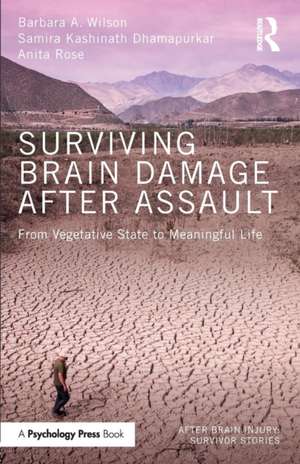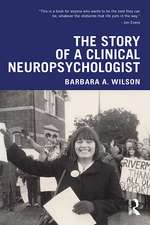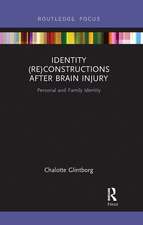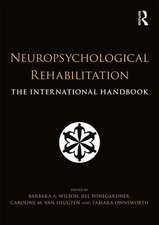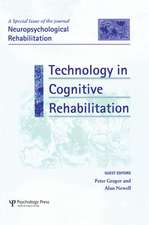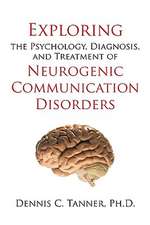Surviving Brain Damage After Assault: From Vegetative State to Meaningful Life: After Brain Injury: Survivor Stories
Autor Barbara A. Wilson, Samira Kashinath Dhamapurkar, Anita Roseen Limba Engleză Paperback – feb 2016
The book presents a series of interviews with Gary, his mother Wendie, who never gave up, the medical team who initially treated him, and the therapists who worked with him over a period of three years. Through their testimony we learn about the devastating effects which can follow a serious assault to the head, and the long process of recovery over several years. With specialist rehabilitation and continuing family support Gary has exceeded expectations and, apart from some minor physical problems, he is now a normal young man.
Surviving Brain Damage after Assault shows that, contrary to popular belief, considerable gains can be made by people who have experienced a long period of reduced consciousness. The book will be of great value to all professionals working in rehabilitation - psychologists, speech and language therapists, occupational therapists, social workers and rehabilitation doctors, and to people who have sustained a brain injury and their families.
| Toate formatele și edițiile | Preț | Express |
|---|---|---|
| Paperback (1) | 198.26 lei 22-36 zile | +8.68 lei 5-11 zile |
| Taylor & Francis – feb 2016 | 198.26 lei 22-36 zile | +8.68 lei 5-11 zile |
| Hardback (1) | 1158.91 lei 43-57 zile | |
| Taylor & Francis – 10 feb 2016 | 1158.91 lei 43-57 zile |
Din seria After Brain Injury: Survivor Stories
-
 Preț: 198.77 lei
Preț: 198.77 lei -
 Preț: 198.14 lei
Preț: 198.14 lei -
 Preț: 199.56 lei
Preț: 199.56 lei -
 Preț: 175.41 lei
Preț: 175.41 lei -
 Preț: 175.08 lei
Preț: 175.08 lei -
 Preț: 138.98 lei
Preț: 138.98 lei -
 Preț: 175.19 lei
Preț: 175.19 lei -
 Preț: 162.31 lei
Preț: 162.31 lei -
 Preț: 162.56 lei
Preț: 162.56 lei -
 Preț: 168.05 lei
Preț: 168.05 lei -
 Preț: 359.00 lei
Preț: 359.00 lei -
 Preț: 197.79 lei
Preț: 197.79 lei -
 Preț: 231.24 lei
Preț: 231.24 lei -
 Preț: 235.32 lei
Preț: 235.32 lei -
 Preț: 298.41 lei
Preț: 298.41 lei -
 Preț: 208.75 lei
Preț: 208.75 lei -
 Preț: 234.21 lei
Preț: 234.21 lei -
 Preț: 175.92 lei
Preț: 175.92 lei -
 Preț: 208.79 lei
Preț: 208.79 lei -
 Preț: 218.38 lei
Preț: 218.38 lei -
 Preț: 208.20 lei
Preț: 208.20 lei
Preț: 198.26 lei
Nou
Puncte Express: 297
Preț estimativ în valută:
37.94€ • 39.71$ • 31.58£
37.94€ • 39.71$ • 31.58£
Carte disponibilă
Livrare economică 10-24 martie
Livrare express 21-27 februarie pentru 18.67 lei
Preluare comenzi: 021 569.72.76
Specificații
ISBN-13: 9781138824584
ISBN-10: 1138824585
Pagini: 172
Ilustrații: 11 black & white illustrations, 6 black & white tables, 7 black & white halftones, 4 black & white line drawings
Dimensiuni: 138 x 216 x 13 mm
Greutate: 0.23 kg
Ediția:1
Editura: Taylor & Francis
Colecția Routledge
Seria After Brain Injury: Survivor Stories
Locul publicării:Oxford, United Kingdom
ISBN-10: 1138824585
Pagini: 172
Ilustrații: 11 black & white illustrations, 6 black & white tables, 7 black & white halftones, 4 black & white line drawings
Dimensiuni: 138 x 216 x 13 mm
Greutate: 0.23 kg
Ediția:1
Editura: Taylor & Francis
Colecția Routledge
Seria After Brain Injury: Survivor Stories
Locul publicării:Oxford, United Kingdom
Public țintă
General and Professional Practice & DevelopmentCuprins
1. Introduction to Brain Damage Part One 2. Introduction to Brain Damage Part Two 3. Imaging procedures in understanding brain injury 4. The assault: as described by Wendie, Gary’s mum, and other members of the family 5. Early days in Hospital 6. Admission to the Raphael Medical Centre 7. Assessments While Gary was Vegetative and Minimally Conscious 8. Cranioplasty 9. Waking up 10. Rehabilitation Through Music Therapy (With a contribution from Melanie Cornell, Music Therapist) 11. Ongoing Rehabilitation 12. Home Evaluation 13. Gary today 14. Why did Gary do so well?
Recenzii
This is a most valuable and detailed account of delayed, gradual and continuing recovery after a very severe traumatic brain injury. The authors' thoughtful and detailed discussion of the reasons for such unexpected and prolonged improvement will be crucially important in the planning of rehabilitation research and in developing health service provision. - Lindsay McLellan, Formerly Europe Professor of Rehabilitation, University of Southampton, UK and Medical Adviser to the Brain Injury Group
Wilson, Dhamapurkar and Rose present a fascinating, thought provoking yet scientific account of late recovery from the Minimally Conscious State. This challenges the concept of ‘cut-off’ after which recovery is unlikely. Family and client perspectives enhance the account. This informative book will be of interest to all working with people with long term Disorders of Consciousness. - Agnes Shiel, Professor of Occupational Therapy, National University of Ireland, Galway, Ireland
Wilson, Dhamapurkar and Rose present a fascinating, thought provoking yet scientific account of late recovery from the Minimally Conscious State. This challenges the concept of ‘cut-off’ after which recovery is unlikely. Family and client perspectives enhance the account. This informative book will be of interest to all working with people with long term Disorders of Consciousness. - Agnes Shiel, Professor of Occupational Therapy, National University of Ireland, Galway, Ireland
This is a most valuable and detailed account of delayed, gradual and continuing recovery after a very severe traumatic brain injury. The subject is a young man who has received excellent medical and surgical care and exemplary rehabilitation input from his family and the rehabilitation team involved over several years. The authors' thoughtful and detailed discussion of the reasons for such unexpected and prolonged improvement raise many questions.
This case is a further example of the fact that people's brains are potentially able to acquire new patterns of activity and responsiveness when they undergo intensive training and acquire new skills - not only in those who are healthy, but also (to a proportional degree) after severe damage to the brain has occurred. The time course of these changes in such patients after brain injury mirrors that of active skill acquisition in normal adults, rather than passive 'spontaneous' recovery from injury. It is crucially important that this principle is recognised, both in the planning of rehabilitation research and in health service provision, if the mechanisms involved are to be fully understood and optimal recovery from brain injury is to be achieved for all. – Lindsay McLellan, Formerly Europe Professor of Rehabilitation, University of Southampton, UK and Medical Adviser to the Brain Injury Group
Wilson, Dhamapurkar and Rose present a fascinating, thought provoking yet scientific account of late recovery from the Minimally Conscious State. This challenges the concept of ‘cut-off’ after which recovery is unlikely. Family and client perspectives enhance the account. This informative book will be of interest to all working with people with long term Disorders of Consciousness. - Agnes Shiel, Professor of Occupational Therapy, National University of Ireland, Galway, Ireland
Wilson, Dhamapurkar and Rose present a fascinating, thought provoking yet scientific account of late recovery from the Minimally Conscious State. This challenges the concept of ‘cut-off’ after which recovery is unlikely. Family and client perspectives enhance the account. This informative book will be of interest to all working with people with long term Disorders of Consciousness. - Agnes Shiel, Professor of Occupational Therapy, National University of Ireland, Galway, Ireland
This is a most valuable and detailed account of delayed, gradual and continuing recovery after a very severe traumatic brain injury. The subject is a young man who has received excellent medical and surgical care and exemplary rehabilitation input from his family and the rehabilitation team involved over several years. The authors' thoughtful and detailed discussion of the reasons for such unexpected and prolonged improvement raise many questions.
This case is a further example of the fact that people's brains are potentially able to acquire new patterns of activity and responsiveness when they undergo intensive training and acquire new skills - not only in those who are healthy, but also (to a proportional degree) after severe damage to the brain has occurred. The time course of these changes in such patients after brain injury mirrors that of active skill acquisition in normal adults, rather than passive 'spontaneous' recovery from injury. It is crucially important that this principle is recognised, both in the planning of rehabilitation research and in health service provision, if the mechanisms involved are to be fully understood and optimal recovery from brain injury is to be achieved for all. – Lindsay McLellan, Formerly Europe Professor of Rehabilitation, University of Southampton, UK and Medical Adviser to the Brain Injury Group
Descriere
This inspirational book documents the story of Gary, who at the age of twenty eight was assaulted by a gang with baseball bats and a hammer, resulting in several skull fractures and severe brain damage. Through a combination of personal testimony and scientific commentary we learn about the devastating effects which can follow a serious assault to the head, and the long process of recovery over several years. The book will be of great value to all professionals working in rehabilitation, and to people who have sustained a brain injury and their families.
